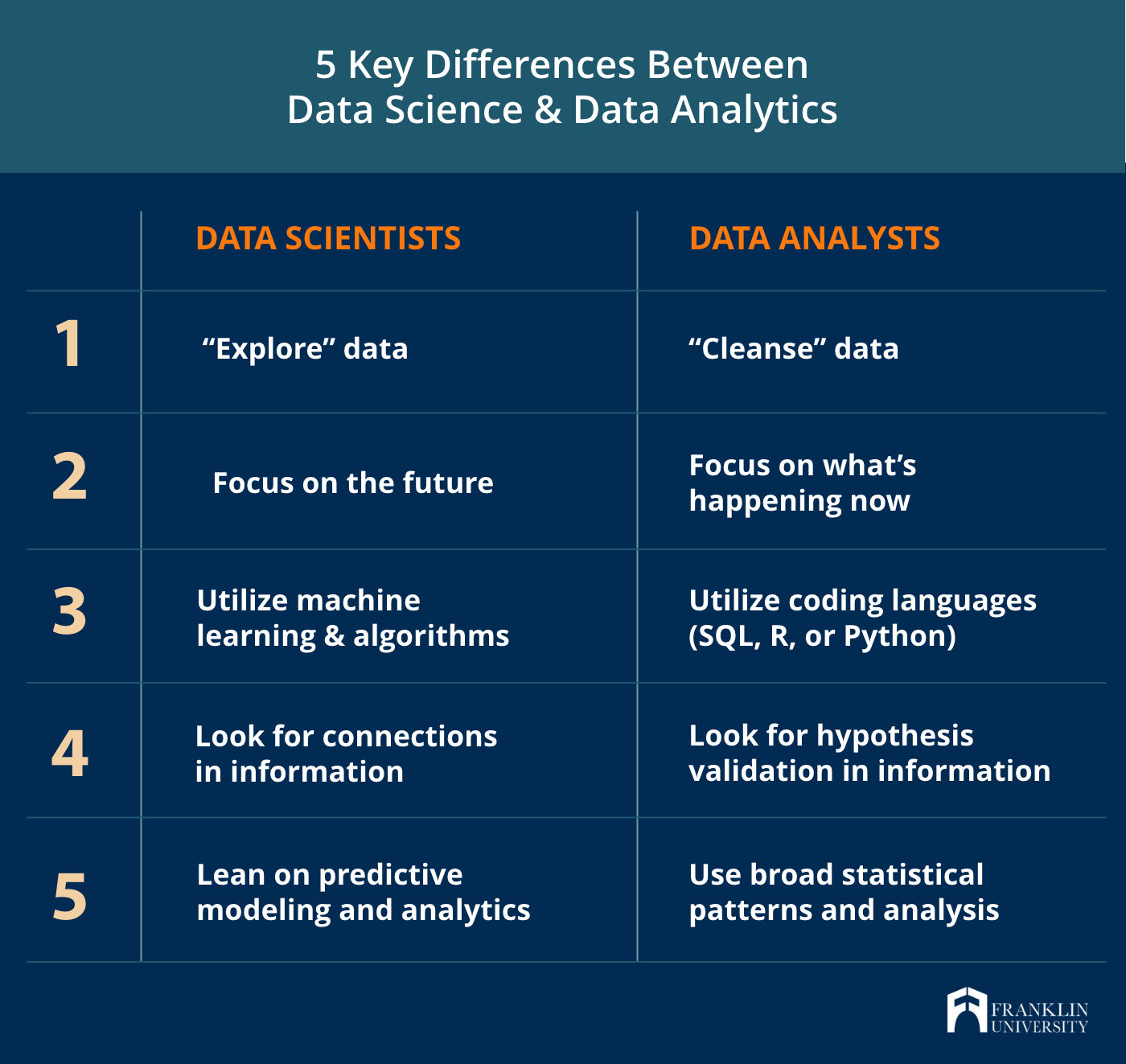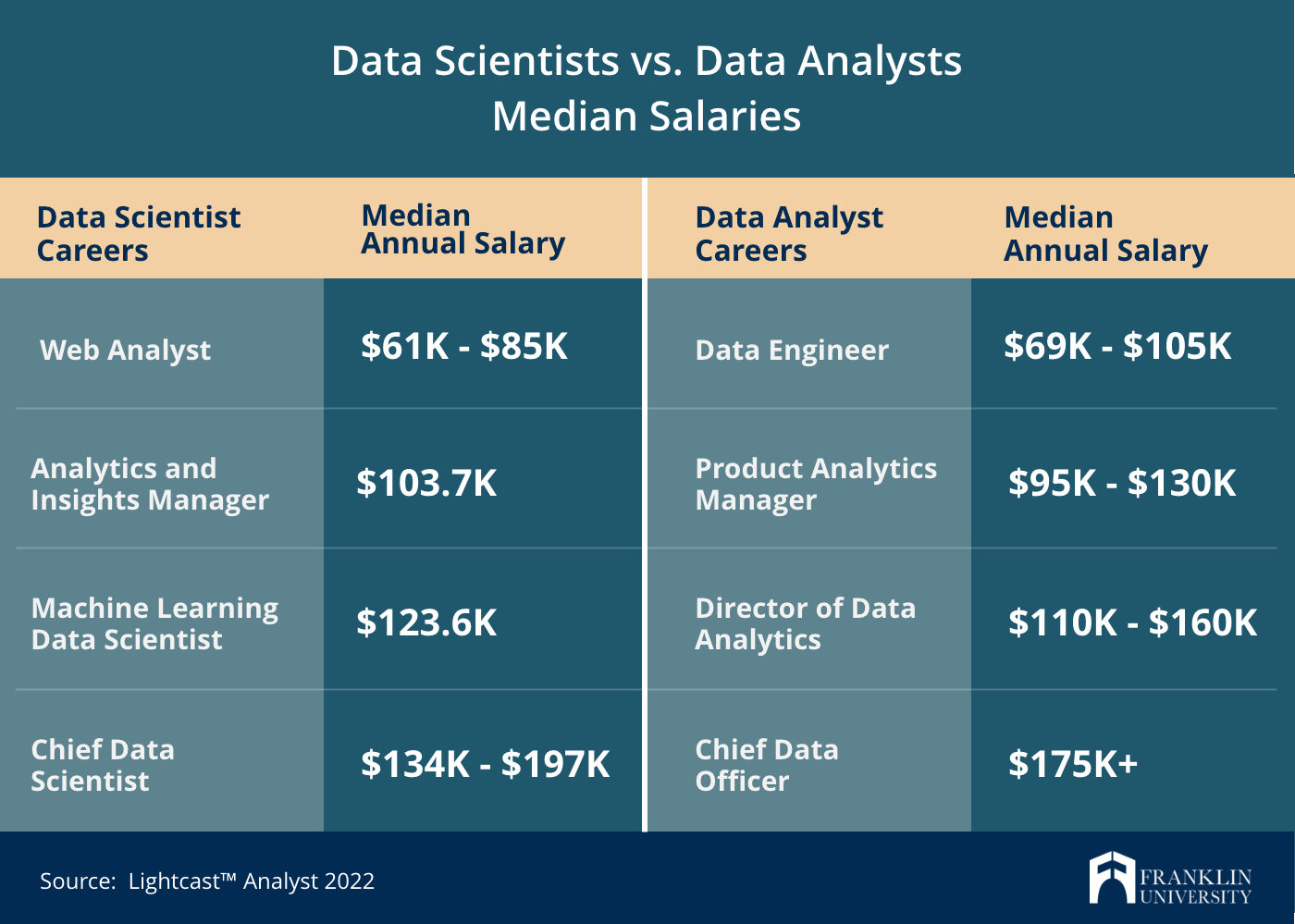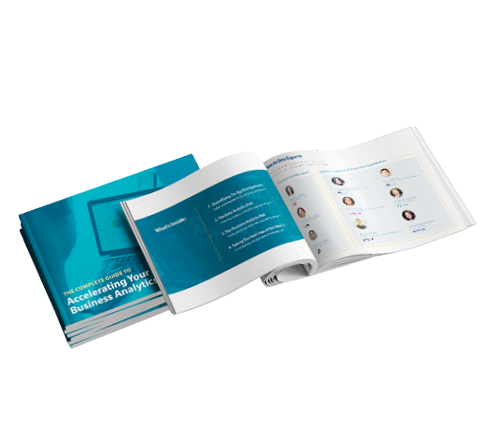Request Information
We're Sorry
There was an unexpected error with the form (your web browser was unable to retrieve some required data from our servers). This kind of error may occur if you have temporarily lost your internet connection. If you're able to verify that your internet connection is stable and the error persists, the Franklin University Help Desk is available to assist you at helpdesk@franklin.edu, 614.947.6682 (local), or 1.866.435.7006 (toll free).
Just a moment while we process your submission.

Data Science vs. Data Analytics: Differences You Need To Know
Data-driven careers are in high demand. And that demand is only increasing. Lightcast™ estimates that in the next decade there will be a need for 30,000 more data professionals than are working today.
As the rush to fill those positions heats up, it will certainly be reflected in paychecks. Professionals who currently work with data have an average yearly base salary of $100,000 according to Lightcast™. (Although with the right degrees and experience that number grows.)
If you're interested in this field, there are two primary paths -- data science and data analytics. On the surface they may seem very similar, but behind the curtains they are vastly different professions requiring differing skills.
Which is right for you? Let's take a look at each field and learn more.
What Is Data Science?
The field of data science is one of possibility. Using scientific methods, processes and algorithms, a data scientist digs through the clutter of raw data to find information and insights. The results of their efforts will be used to make changes across applications.
People who excel in data science are strong in math, machine learning, predictive modeling and data processing.
Melissa Schafer, data scientist sr. manager at National General Insurance Company, explains that each day at her job is like solving a puzzle.
“There are no two projects that are exactly the same, no two datasets that are identical,” she says. “I like knowing that the answer to any question is out there, you just need to spend the time to dig through the data, sort the useful from the not, and assemble insights that can translate to tangible actions.”
The top-five skill sets a data scientist needs are:
- Math (particularly statistics)
- Programming skills (R, Python, Hadoop and SQL)
- Data processing
- Data visualization
- Machine learning
Get a FREE roadmap that includes insider information to help you maximize the many opportunities in the fast-growing field of Big Data.
What is Data Analytics?
At its core, data analytics is the technical process of mining and analyzing data in order to identify current patterns and business insights. A data analyst is responsible for processing (and understanding) large amounts of information, often through the use of assorted analytical tools.
Dr. Nimet Alpay, chair of the M.S. in Data Analytics program at Franklin University explains “Data analysts work with large data sets to identify trends, develop data models and bring insights to solve business problems. They use programming, coding, statistics and modeling methods. It makes sense for professionals with some technical background to choose this field.”
The top-five skill sets a data analytics professional needs are:
- Presentation skills
- Data visualization
- Technical skills (Excel, SQL)
- Math (algebra and calculus)
- Communication
Data Science vs Data Analytics: 5 Key Differences

Who Earns More: Data Analysts or Data Scientists?
The first factor to consider when choosing a career is the simplest one – do you love the work. Next you’ll need to decide if it’s a career where you can make a living.
For data analysts and data scientists, the answer to that second question is a resounding yes. And the more experience you acquire, and the further you go in your education, the higher you can climb.
How high? Here’s an example of how a salary can grow in a chosen career path.

5 Questions to See Which Data-Focused Career is Right For You
- Do you like linear work plans or are you comfortable with “experiments?”
Data scientists create a foundational level of information and then experiment with the known to find the (unknown) potential in the information. - Is math (in the broad sense) an area of strength?
Math and statistics are important in both fields but they are particularly important tools for data scientists. - Do you like working with programming tools like Python and R?
While a knowledge of these programs is helpful to a data scientist, these are essential tools for a data analytics professional. - Can you work with unstructured data? Or is your strength in visualized data sets?
Data scientists tend to work in more open data fields, but when you’re working in data analytics you have more structure in your data sets. - Are you interested in trends? Or potential?
The goal of both professionals is to provide actionable insights, the difference is in how they get there. A data analyst works with data sets to find patterns and trends and a data scientist (using different tools and understandings) works toward “What if…” predictions.
Take the Next Step Toward Growing Your Data-Based Career
After you’ve chosen your career path, the next step is to make sure you have the skills and knowledge for success. A great place to start is with a degree program. Look for one that focuses on real-world skill building and that will prepare you for a long, rewarding career in data.
Franklin University offers a fully online M.S. in Data Analytics that can be completed in as few as 19 months. You’ll learn hands-on skills using industry-leading tools, programming and modeling techniques. Classes are project-based and practical, meaning you will be working on real-life problems that are relevant and current with field best practices. You also benefit from live class sessions so you have close interaction with your professors.
And the master’s program at Franklin is constructed for working adults with class times that are flexible and fast. Are you ready to advance your career?





